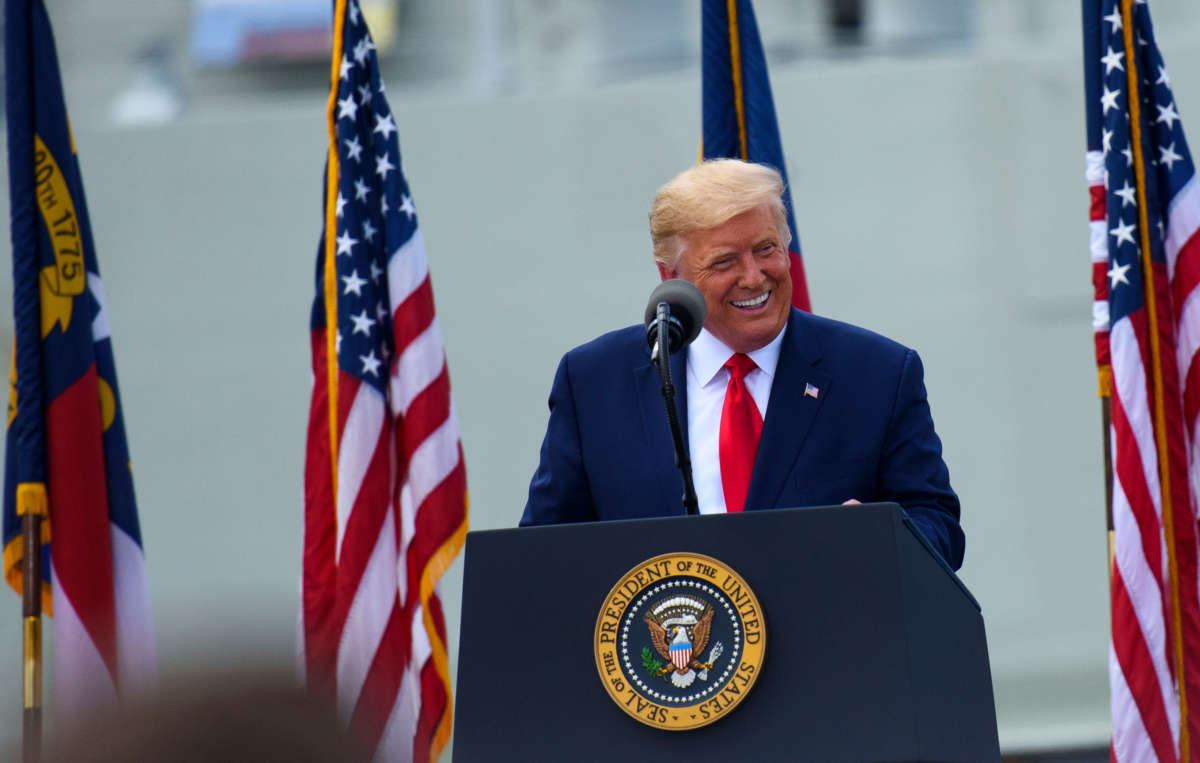President Trump on Wednesday appeared to encourage residents in North Carolina to attempt voter fraud — a felony crime — to test whether the system would catch voters who tried to cast two ballots in a single election.
“Let them send it in and let them go vote, and if their system’s as good as they say it is, then obviously they won’t be able to vote,” Trump suggested. “If it isn’t tabulated, they’ll be able to vote.”
“And that’s what they should do,” the president added.
Tim Murtaugh, the communications director for Trump’s reelection campaign, later tried to explain that Trump was trying to encourage residents to verify whether their absentee ballot was counted if they chose to vote in that manner.
“President Trump encourages supporters to vote absentee-by-mail early, and then show up in person at the polls or the local registrar to verify that their vote has already been counted,” Murtaugh said.
However, that is not how North Carolina checks against double voting when it comes to absentee ballots. A person who mails their ballot in but then tries to vote on election day will have that in-person vote counted. The absentee ballot, which would be counted later on, will then be viewed as “spoiled,” and won’t count in the final tabulation.
Trump’s insistence that North Carolina voters try to vote twice in this year’s election would likely cause confusion and chaos for poll workers on Election Day. It would also lead to some harsh consequences for any voter attempting to do what the president is calling for — voting twice in the same election is a Class I felony in the state.
Trump’s own actions might be illegal, too, as state law also forbids anyone to “induce” someone else to vote twice with the intent to commit fraud in an election. Rick Hasen, law professor at the University of California, Irvine School of Law, explained in a post at Election Law Blog that a case could be made that Trump’s words could be seen as such.
“He was encouraging people to vote both by mail and in person. The questionable part is about his intent,” Hasen wrote:
It sounds like he was suggesting an attempt at double voting as a means of testing the integrity of the system, or assuring that his voters can cast at least one ballot for him. Is that a fraudulent intent? I could see how a jury could find it to be so, especially given Trump’s other statements suggesting he believes that such double voting would not be caught by election officials.
Trump has for several weeks made several comments questioning the integrity of this year’s presidential election, putting particular emphasis on doubting the efficacy and veracity of mail-in voting, suggesting — without providing proof and in spite of evidence to the contrary — that the practice is rife with fraud. Officials within his administration, including Postmaster General Louis DeJoy, have also implemented new policies that have the potential to threaten the ability of millions of Americans to have their ballots counted on time if they vote absentee.
Polling suggests a high number of Americans are planning to vote by mail or earlier than Election Day this year, with many being fearful about the possibility of spreading or contracting coronavirus. An NBC News/SurveyMonkey poll published this week found that 19 percent of voters will cast their ballots early in person, while 33 percent say they will ask for an absentee ballot to vote through the mail. Only a third of Americans are planning to vote in person on November 3, the poll noted.
We have 8 days to raise $48,000 — we’re counting on your support!
For those who care about justice, liberation and even the very survival of our species, we must remember our power to take action.
We won’t pretend it’s the only thing you can or should do, but one small step is to pitch in to support Truthout — as one of the last remaining truly independent, nonprofit, reader-funded news platforms, your gift will help keep the facts flowing freely.
